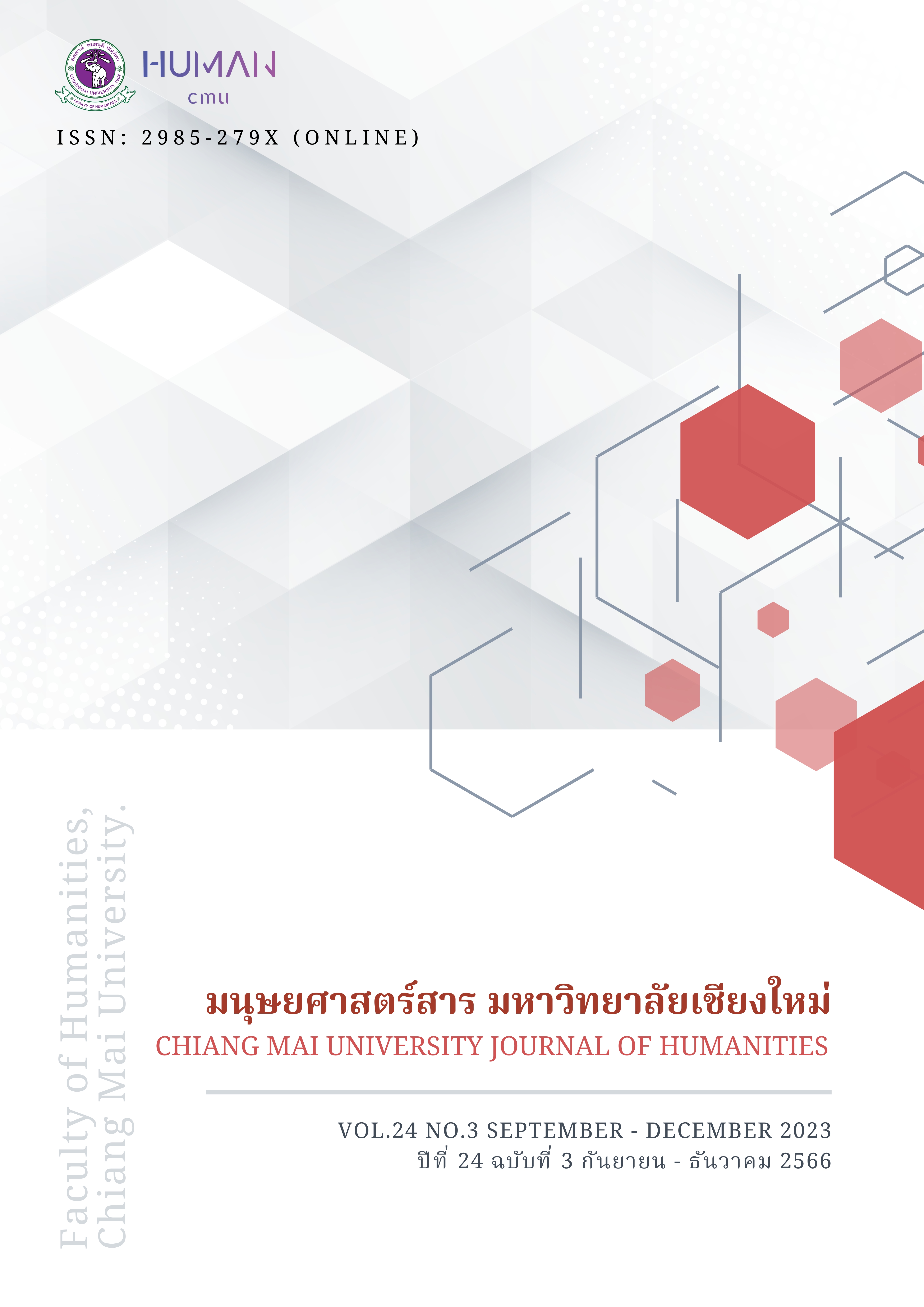มโนอุปลักษณ์เกี่ยวกับการพัฒนาเมือง ในการปราศรัยหาเสียงเลือกตั้งผู้ว่าราชการกรุงเทพมหานคร ของนายชัชชาติ สิทธิพันธุ์: การถ่ายทอดอุดมการณ์ผ่านอุปลักษณ์
Main Article Content
บทคัดย่อ
งานวิจัยนี้มีวัตถุประสงค์เพื่อ 1) เพื่อวิเคราะห์มโนอุปลักษณ์และถ้อยคำอุปลักษณ์เกี่ยวกับการพัฒนาเมืองในการปราศรัยหาเสียงเลือกตั้งผู้ว่าราชการกรุงเทพมหานครใน พ.ศ. 2565 ของนายชัชชาติ สิทธิพันธุ์ และ 2) เพื่ออภิปรายหน้าที่ของมโนอุปลักษณ์ในการถ่ายทอดอุดมการณ์ในการปราศรัยหาเสียงเลือกตั้งผู้ว่าราชการกรุงเทพมหานครของนายชัชชาติ สิทธิพันธุ์ โดยผู้วิจัยได้ศึกษาเอกสารที่เกี่ยวข้องกับการใช้อุปลักษณ์และคลิปวิดีโอการปราศรัยหาเสียงครั้งสำคัญของนายชัชชาติ สิทธิพันธุ์ ผู้วิจัยใช้แนวคิดเรื่องมโนอุปลักษณ์ในงานเขียนของ Lakoff and Johnson (1980) และงานเขียนของ Goatly (1997) เรื่องหน้าที่ของอุปลักษณ์ เป็นกรอบเพื่อศึกษาอุปลักษณ์ในการปราศรัยดังกล่าว
ผลการวิจัยพบมโนอุปลักษณ์เกี่ยวกับการพัฒนาเมืองในการปราศรัยทั้งสิ้น 7 มโนอุปลักษณ์ ได้แก่ [การพัฒนาเมือง คือ การเดินทาง] [การพัฒนาเมือง คือ การดูแลร่างกาย] [การพัฒนาเมือง คือ การเจียระไนอัญมณี] [การพัฒนาเมือง คือ การเปลี่ยนแปลงวัตถุให้โปร่งใส] [การพัฒนาเมือง คือ การปลูกต้นไม้] [การพัฒนาเมือง คือ การแข่งขันวิ่งมาราธอน] และ [การพัฒนาเมือง คือ การทำธุรกิจ] มโนอุปลักษณ์ที่ผู้ใช้ภาษาใช้บ่อยครั้งที่สุดคือ มโนอุปลักษณ์ [การพัฒนาเมือง คือ การเดินทาง] โดยพบถ้อยคำอุปลักษณ์เกี่ยวกับมโนอุปลักษณ์ดังกล่าว 20 ถ้อยคำ สำหรับการทำหน้าที่ในการถ่ายทอดอุดมการณ์นั้น ผู้ใช้ภาษาได้ถ่ายทอดอุดมการณ์ผ่านมโนอุปลักษณ์ 4 อุดมการณ์ ได้แก่ 1) อุดมการณ์ประชาธิปไตยแบบมีส่วนร่วม 2) อุดมการณ์ทุนนิยม 3) อุดมการณ์ต่อต้านทุจริต และ 4) อุดมการณ์แบบรัฐสวัสดิการ
Article Details

อนุญาตภายใต้เงื่อนไข Creative Commons Attribution-NonCommercial-NoDerivatives 4.0 International License.
เอกสารอ้างอิง
กมลทิพย์ สมบูรณ์พงษ์ และเชิดชัย อุดมพันธ์. (2563). อุปลักษณ์มโนทัศน์ความขัดแย้งทางการเมืองไทย:
การศึกษาเชิงอรรถศาสตร์ปริชานในข่าวหนังสือพิมพ์. วารสารวิทยาลัยบัณฑิตเอเชีย, 10(4),
-135.
ชฎาพร สิทธสาตร์ นรีกานต์ ศรีสินธ์ พัชริศา วรรณะ และ วิไลศักดิ์ กิ่งคำ. (2566). การศึกษากลวิธีทางภาษา
“ชัชชาติ สิทธิพันธุ์” ในการหาเสียงรับเลือกตั้งผู้ว่าราชการกรุงเทพมหานครผ่านสื่อออนไลน์. วารสารภาษาไทยและวัฒนธรรมไทย, 9(1), 43-71.
ชาญชัย คงเพียรธรรม. (2561). การสร้างอุดมการณ์ทางการเมืองผ่านอุปลักษณ์ข้าวจากภาษิตเขมร.
วารสารศิลปศาสตร์ มหาวิทยาลัยสงขลานครินทร์, 10(1), 33-58.
ธีระยุทธ สุริยะ. (2562). “โรฮิงญาเป็นภัยอันตราย” ภาพตัวแทนของชาวโรฮิงญาในวาทกรรมข่าว:
การวิเคราะห์อุปลักษณ์เชิงวิพากษ์. วารสารมนุษยศาสตร์วิชาการ, 26(1), 252-285.
ประจักษ์ ก้องกีรติ. (2562). ประชาธิปไตย: หลากหลายความหมาย หลายรูปแบบ. สำนักพิมพ์ศยาม.
พภัสสรณ์ วรภัทร์ถิระกุล. (2560). การบริหารจัดการภาครัฐไทยภายใต้ระบบรัฐสวัสดิการ.
วารสารวิทยาการจัดการ มหาวิทยาลัยราชภัฎนครปฐม, 4(1), 112-113.
รัชนีย์ญา กลิ่นน้ำหอม. (2551). อุปลักษณ์ที่นักการเมืองไทยใช้: การศึกษาตามแนวอรรถศาสตร์ปริชาน
และวัจนปฏิบัติศาสตร์. [วิทยานิพนธ์ปริญญาดุษฎีบัณฑิต, จุฬาลงกรณ์มหาวิทยาลัย]. https://dric.nrct.go.th/Search/SearchDetail/218082
ศูนย์สำรวจความคิดเห็น นิด้าโพล. (2565). การสำรวจคะแนนนิยมทางการเมืองรายไตรมาส ครั้งที่ 1/2565.
https://nidapoll.nida.ac.th/data/survey/uploads/FILE-1648277064872.pdf
สิทธิธรรม อ๋องวุฒิวัฒน์. (2560). การศึกษากลวิธีทางภาษาจาก มุมมองวัจนปฏิบัติศาสตร์ : พระบรมราโชวาท
พระบาทสมเด็จพระเจ้าอยู่หัวภูมิพลอดุลยเดช ในพิธีพระราชทานปริญญาบัตร (พ.ศ. 2493-2537). วารสารร่มพฤกษ์ มหาวิทยาลัยเกริก, 35(3), 9-37.
เสาวรักษ์ หงษ์ไทย. (2560). ภาวะผู้นําของพลเอก ประยุทธ์ จันทร์โอชา ตามเจตคติของประชาชน. (วิทยานิพนธ์ปริญญามหาบัณฑิต, มหาวิทยาลัยบูรพา). https://tdc.thailis.or.th/tdc/
browse.php?option=show&browse_type=title&titleid=511823
อรรถจักร์ สัตยานุรักษ์. (2556, มีนาคม). จุดจบของรัฐ-สังคมแบบองคาพยพในสังคมการเมืองไทย.
https://www.bangkokbiznews.com/blogs/columnist/101669
อภิชาติ สถิตนิรามัย ยุกติ มุกดาวิจิตร และนิติ ภวัครพันธุ์. (2556). ทบทวนภูมิทัศน์การเมืองไทย.
สถาบันศึกษานโยบายสาธารณะ มหาวิทยาลัยเชียงใหม่.
Abrams, M. H., & Harpham, G. G. (2009). A glossary of literary terms. Wadsworth Cengage
Learning.
Bangnogkhwag, W. (2003). A study of political metaphor on the front page of two Thai
English newspaper. [Master degree’s thesis, Srinakharinwirot University].
Research Database (ThaiLis).
Cammaerts, B. (2012). The strategic use of metaphors by political and media elites:
The 2007-11 Belgian constitutional crisis. International Journal of Media & Cultural
Politics, 8(2), 229-249.
Chaiyasat, C., & Sudajit-apa, M. (2017). A corpus-assisted critical metaphor analysis of General
Prayuth Chan-o-cha’s English subtitled weekly addresses on politics and democracy-related in times of political turmoil. Journal of Studies in the English Language, 12(1), 70-109.
Charteris-Black, J. (2004). Corpus approaches to critical metaphor analysis. Palgrave
Macmillan.
Charteris-Black, J. (2005). Politicians and rhetoric: The persuasive power of metaphor.
Palgrave Macmillan.
Charteris-Black, J. (2017). Competition metaphors and ideology. In R. Wodak & B. Forchtner
(Eds.), The Routledge handbook of language and politics (pp.202-218). Routledge.
Evans, V., & Green, M. (2006). Cognitive linguistics: An introduction. Routledge.
Goatly, A. (1997). The language of metaphors. Routledge.
Lakoff, G., & Johnson, M. (1980). Metaphors we live by. University of Chicago Press.
Radden, G., & Dirven, R. (2007). Cognitive English grammar. John Benjamins.
Tyson, L. (2011). Using critical theory: How to read and write about literature. Routledge.
Weber, M. (2002). The Protestant ethic and the spirit of capitalism: And other writings.
Penguin Classics.


